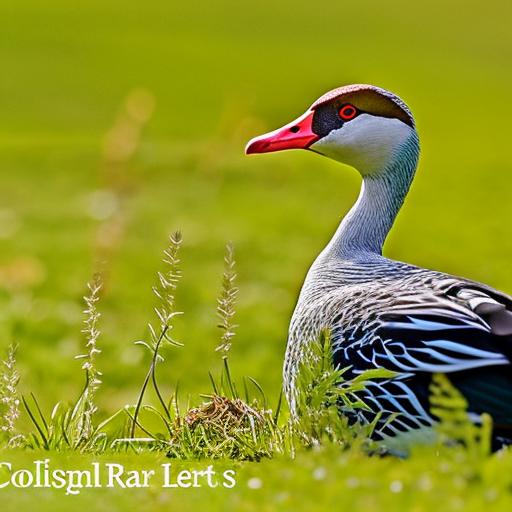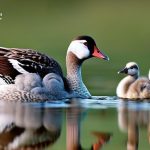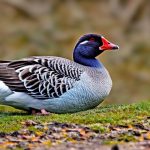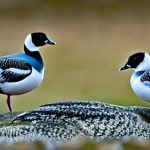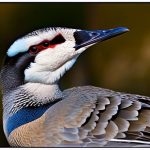Geese can be a beautiful sight in nature, but when they start invading your lawn, they can quickly become a nuisance. Geese are attracted to well-maintained lawns because they provide easy access to food and water. They can cause damage to the grass, leave droppings everywhere, and even become aggressive towards people and pets. Understanding the behavior of geese is the first step in finding a solution to keep them away from your property. Geese are social animals and often travel in flocks, so if one goose finds your lawn appealing, it’s likely that others will follow. They are also creatures of habit and will return to the same location if they find it to be a suitable habitat. It’s important to address the issue as soon as possible to prevent the problem from escalating.
Geese are protected under the Migratory Bird Treaty Act, which means that it is illegal to harm or kill them without proper permits. This makes finding humane and effective methods to deter geese from your lawn even more important. There are several natural, physical, and technological deterrents that can be used to keep geese away without causing them harm. By understanding the habits and needs of geese, you can implement strategies to make your lawn less attractive to them and encourage them to find a more suitable habitat elsewhere.
Key Takeaways
- Geese can cause damage to lawns and pose health risks due to their droppings
- Natural deterrents like planting tall grasses and using predator decoys can help keep geese away
- Physical barriers such as fencing and netting can effectively prevent geese from accessing the lawn
- Sound and visual deterrents like ultrasonic devices and reflective tape can scare off geese
- Creating an inhospitable environment by removing food sources and reducing water access can discourage geese from staying on the lawn
- Consistent maintenance, including regular cleaning and upkeep of deterrents, is essential for long-term geese control
- Seek professional help if geese infestation persists despite efforts or if legal regulations need to be considered
Natural deterrents: How to keep geese away without harming them
One of the most effective natural deterrents for keeping geese off your lawn is planting tall grasses and shrubs around the perimeter. Geese prefer open spaces where they can easily spot predators, so creating barriers with tall vegetation can make your lawn less appealing to them. Additionally, geese are attracted to water sources, so reducing access to water can also discourage them from frequenting your property. This can be done by installing motion-activated sprinklers or using landscaping techniques to redirect water away from your lawn.
Another natural deterrent is the use of certain plants that geese find unappealing. For example, geese tend to avoid areas with plants that have strong odors or prickly textures. Planting species such as juniper, holly, or ornamental grasses can help deter geese from entering your lawn. These plants not only create a physical barrier but also emit scents that are unpleasant to geese, making them less likely to linger on your property.
In addition to planting deterrents, creating an environment that is less attractive to geese can also help keep them away. This includes removing any sources of food, such as spilled birdseed or pet food, and keeping your lawn well-maintained to minimize areas where geese can forage for insects and other food sources. By implementing these natural deterrents, you can effectively discourage geese from making your lawn their home without causing them any harm.
Physical barriers: Fencing and other methods to keep geese off the lawn
Physical barriers are another effective way to keep geese off your lawn without causing them harm. One of the most common physical barriers is the use of fencing. Installing a fence around the perimeter of your property can prevent geese from accessing your lawn. However, it’s important to use the right type of fencing, as some geese are capable of flying over low fences. A fence that is at least 3 feet high and made of materials that are difficult for geese to perch on, such as smooth metal or plastic, can be effective in deterring them.
Another physical barrier that can be used to keep geese off your lawn is the installation of floating barriers in bodies of water near your property. Geese are attracted to water sources, so placing floating barriers in ponds or lakes can prevent them from landing and foraging on your property. These barriers can be made of materials such as plastic or wire mesh and should be positioned in a way that prevents geese from accessing the shore.
In addition to fencing and floating barriers, there are other physical deterrents that can be used to keep geese away from your lawn. These include placing obstacles such as large rocks or decoy predators, such as fake coyotes or owls, in areas where geese tend to gather. These visual deterrents can make geese feel unsafe and encourage them to find a more secure habitat. By implementing physical barriers and deterrents, you can effectively keep geese off your lawn without causing them any harm.
Sound and visual deterrents: Using technology to scare off geese
Sound and visual deterrents can be effective tools for keeping geese away from your lawn without causing them harm. Geese are sensitive to loud noises and sudden movements, so using technology to create these stimuli can help deter them from frequenting your property. One popular sound deterrent is the use of sonic devices that emit loud noises at random intervals. These devices can be placed around the perimeter of your property and programmed to emit sounds that are unpleasant to geese, such as predator calls or distress signals.
In addition to sound deterrents, visual deterrents can also be effective in scaring off geese. One common visual deterrent is the use of reflective objects, such as tape or balloons, that move in the wind and create flashes of light. Geese are easily startled by sudden movements and bright lights, so using reflective objects around your property can make them feel uneasy and encourage them to find a more peaceful location.
Another visual deterrent that can be used to keep geese away from your lawn is the installation of laser devices that emit beams of light across open spaces. These devices create a visual barrier that makes it difficult for geese to land and forage on your property. By using sound and visual deterrents, you can effectively discourage geese from making your lawn their home without causing them any harm.
Creating an inhospitable environment: Making your lawn less attractive to geese
Creating an inhospitable environment for geese is an important step in keeping them away from your lawn without causing them harm. Geese are attracted to well-maintained lawns because they provide easy access to food and water. By making changes to your landscaping and maintenance practices, you can make your lawn less appealing to geese and encourage them to find a more suitable habitat elsewhere.
One way to create an inhospitable environment for geese is by reducing access to water sources on your property. Geese are attracted to bodies of water, so minimizing access to ponds, lakes, or other water features can discourage them from frequenting your property. This can be done by installing motion-activated sprinklers or using landscaping techniques to redirect water away from your lawn.
In addition to reducing access to water, creating an inhospitable environment for geese also involves minimizing areas where they can forage for food. This includes removing any sources of food, such as spilled birdseed or pet food, and keeping your lawn well-maintained to minimize areas where geese can find insects and other food sources. By making these changes to your landscaping and maintenance practices, you can effectively make your lawn less attractive to geese and encourage them to find a more suitable habitat elsewhere.
Consistent maintenance: The key to keeping geese away from your lawn
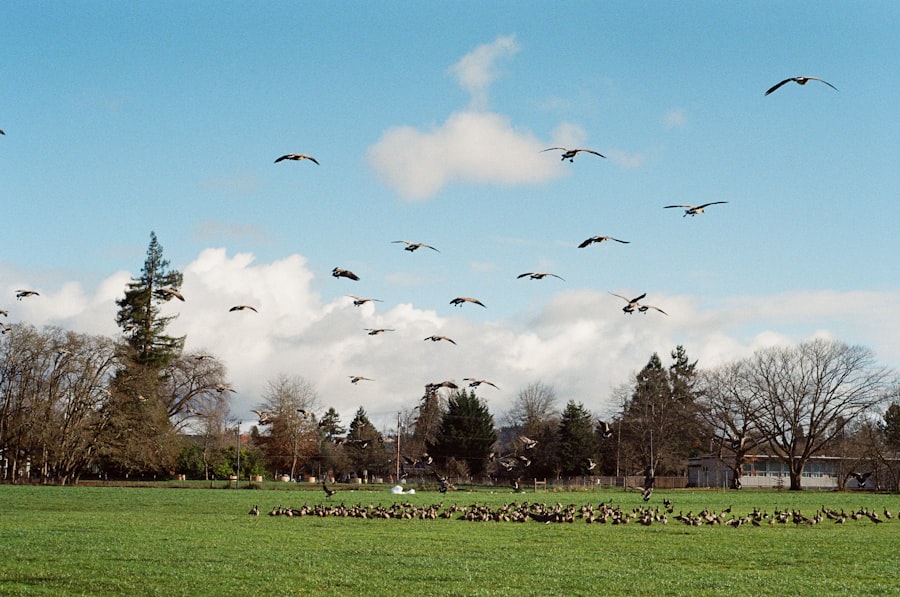
Consistent maintenance is key in keeping geese away from your lawn without causing them harm. Geese are attracted to well-maintained lawns because they provide easy access to food and water. By consistently maintaining your property, you can make it less appealing to geese and encourage them to find a more suitable habitat elsewhere.
One important aspect of consistent maintenance is keeping your lawn mowed at the proper height. Geese prefer open spaces where they can easily spot predators, so maintaining a taller grass height can make your lawn less appealing to them. Additionally, regularly removing fallen leaves, branches, and other debris from your lawn can minimize areas where geese can forage for food.
In addition to regular mowing and debris removal, consistent maintenance also involves minimizing areas where geese can access water sources on your property. This includes repairing any leaks in irrigation systems or redirecting water away from your lawn using landscaping techniques. By consistently maintaining your property, you can effectively make it less attractive to geese and encourage them to find a more suitable habitat elsewhere.
Seeking professional help: When to call in the experts for geese control
If you have tried various methods to keep geese away from your lawn without success, it may be time to seek professional help for geese control. There are companies that specialize in humane and effective methods for deterring geese from properties without causing them harm. These professionals have the knowledge and experience to assess the situation and implement strategies that are tailored to your specific needs.
One common method used by professionals for geese control is the use of border collies. Border collies are highly intelligent herding dogs that have been trained to work with handlers in deterring geese from properties. The presence of a border collie alone is often enough to discourage geese from frequenting an area, as they see the dog as a natural predator and feel unsafe.
Another method used by professionals for geese control is the use of habitat modification techniques. This involves making changes to the landscape and environment of a property in order to make it less appealing to geese. Professionals may install floating barriers in bodies of water near the property or plant tall grasses and shrubs around the perimeter as natural deterrents.
In addition to border collies and habitat modification techniques, professionals may also use sound and visual deterrents such as sonic devices or reflective objects in order to scare off geese. By seeking professional help for geese control, you can effectively address the issue and find a solution that works for you and the geese without causing harm.
Looking to keep geese away from your lawn? Check out our related article on PoultryWizard.com that offers tips and tricks for creating a natural deterrent for geese. By implementing these strategies, you can protect your lawn and garden from unwanted visitors. For more information, visit PoultryWizard.com.
FAQs
What are some effective methods to keep geese away from the lawn?
Some effective methods to keep geese away from the lawn include using visual deterrents such as scarecrows or reflective tape, using sound deterrents such as noise-making devices, applying taste deterrents to the grass, and installing physical barriers like fences or netting.
Are there any natural remedies to keep geese away from the lawn?
Yes, there are natural remedies to keep geese away from the lawn. These include planting tall grasses or shrubs around the perimeter of the lawn to create a natural barrier, using predator decoys such as fake coyotes or dogs, and allowing a well-trained dog to patrol the area.
Is it legal to use certain methods to keep geese away from the lawn?
It is important to check local regulations and laws regarding the use of certain methods to keep geese away from the lawn. Some areas may have restrictions on the use of noise-making devices or the installation of physical barriers.
What are the potential risks of having geese on the lawn?
Having geese on the lawn can lead to several potential risks, including damage to the grass from grazing and droppings, aggressive behavior towards humans or pets, and the potential spread of diseases through their droppings.
How can I prevent geese from returning to the lawn after using deterrent methods?
To prevent geese from returning to the lawn after using deterrent methods, it is important to consistently maintain the chosen method and regularly change or rotate deterrents to prevent the geese from becoming accustomed to them. Additionally, removing any food sources or nesting sites can help discourage geese from returning.
Meet Walter, the feathered-friend fanatic of Florida! Nestled in the sunshine state, Walter struts through life with his feathered companions, clucking his way to happiness. With a coop that’s fancier than a five-star hotel, he’s the Don Juan of the chicken world. When he’s not teaching his hens to do the cha-cha, you’ll find him in a heated debate with his prized rooster, Sir Clucks-a-Lot. Walter’s poultry passion is no yolk; he’s the sunny-side-up guy you never knew you needed in your flock of friends!

